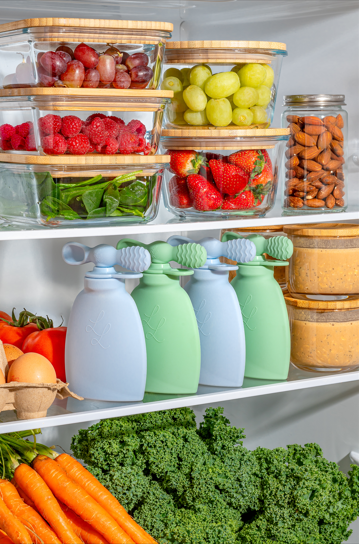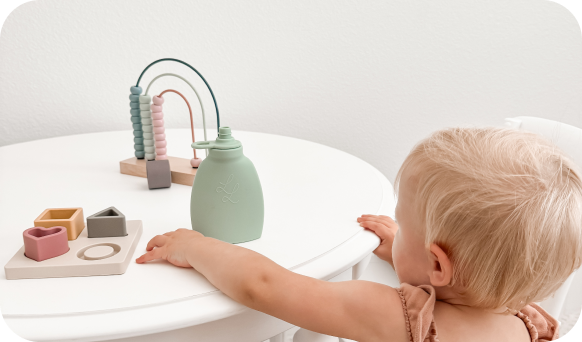Quick & Easy Baby Puree Recipes You Can Make in Under 12 Minutes

Busy parents often feel compelled to reach for prepackaged baby food due to the hustle and bustle of daily life. However, preparing homemade baby puree recipes doesn’t have to be complicated or time-consuming. Not only are these quick recipes easy to make but they’re also packed with essential nutrients that promote your baby's development. Plus, homemade food ensures that you control every ingredient or avoid unnecessary additives and preservatives often found in store-bought options.
In this guide, we will show you baby puree recipes with fresh and nutritious ingredients that you can whip up in under 12 minutes. Each recipe is nutrient-dense and supports your baby’s growth or brain development, gut health and immune function. We'll also provide tips for making meal prep even easier using baby food pouches and highlight the benefits of using Lowcountry Littles’ Palmetto Pouches for convenient storage. Let's dive into five quick baby puree recipes that will keep both you and your baby happy.
Why Homemade Baby Purees Are Better
Homemade baby food is an excellent choice for parents who want to offer their infants the most nutritious and safest meals possible. Here’s why making baby food at home is a smarter option:
- Avoiding Hidden Dangers of Microplastics: Store-bought baby foods can sometimes contain microplastics, which may pose risks to your baby’s health. By making homemade baby purees, you can help protect your child from these hidden dangers. Read our guide on the hidden dangers of microplastics in baby food to keep your child’s meals safe.
- Fresher Ingredients Mean Better Nutrition: Preparation of stage one baby food at home allows you to use fresh nutritious ingredients for your baby. Compared to store bought baby puree recipes, homemade recipes keep important essential vitamins and minerals to make your baby healthy and help brain development.
- Transparency and Control: Considering this food goes into your child’s digestive system, it’s critical you know exactly what you’re feeding them. To help you out, parents can be sure that our baby food puree recipes contain no hidden sugars or stabilizers and synthetic additives—it’s just pure and wholesome nourishment.
- Flexibility to Match Your Baby’s Needs: The homemade puree recipes for baby will allow you to make your baby’s food and will suit your Little one’s specific dietary needs. You can even add delicious and iron rich veggies or vitamin packed fruits and healthy fats to promote faster brain development. Feel free to make adjustments that will allow you to include balanced stage 1 baby foods that meet your baby’s needs.
- Promotes a Lifelong Love for Healthy Foods: Encouraging a diverse palate at a young age with some differences in taste and texture can help your child develop a lifelong love for fresh whole foods. It makes it easier to demonstrate healthy eating habits as your baby grows because homemade stage 1 baby food trains beneficial gut bacteria to grow and feed on healthy nutrients only.
Quick and Easy Baby Puree Recipes
Each of these baby puree recipes can be made in under 12 minutes. This is perfect for parents with limited time. These recipes use simple and wholesome ingredients that are easy to find.
1. Sweet Potato Puree:
Sweet potatoes are an excellent source of vitamin A which is crucial for eye health and immune function. They also provide a natural sweetness that babies love so this makes it a great first food.
Ingredients:
- 1 small sweet potato
- Water or breast milk for consistency
Instructions:
- Peel and chop the sweet potato into small pieces.
- Steam or boil for 8-10 minutes until soft.
- Blend until smooth, adding a small amount of water or breast milk for the desired consistency.
2. Banana and Avocado Mash:
The healthy fats in the avocados and the potassium in the bananas make this a nutrient rich combination that is perfect for brain development. And they are a source of folate which helps cells grow. This mash is a powerhouse for your baby’s diet and can be easily stored in baby food pouches for whenever you need to feed your baby.
Ingredients:
- 1/2 ripe banana
- 1/2 ripe avocado
Instructions:
- Scoop the avocado and slice the banana.
- Mash them together with a fork or blend for a smoother texture.
3. Apple and Pear Puree:
Dietary fiber is rich in apples and pears to aid digestion and help keep the digestive system healthy. Both fruits are also fairly high in vitamin C, which helps boost the immune system. This puree is easy on the stomach and is perfect to introduce fruits to baby's diet.
Ingredients:
- 1 small apple
- 1 small pear
- Water for cooking
Instructions:
- Peel, core and chop the apple and pear.
- Steam for 8-10 minutes until soft.
- Blend until smooth, adding water as needed for the desired texture.
4. Carrot and Pea Puree:
Carrots are packed with beta-carotene, an antioxidant that your baby’s body converts to vitamin A – essential for healthy vision and immune function. Peas are a good source of plant-based protein or vitamin K and iron all of which contribute to strong bones and healthy blood.
Ingredients:
- 1 medium carrot, peeled and chopped
- 1/4 cup peas
Instructions:
- Steam the carrot and peas together for about 8-10 minutes.
- Blend until smooth, adding water for consistency.
5. Spinach and Apple Puree:
Rich in iron and vitamins A, C, and K, spinach supports your baby's bone growth, immune function, and overall development. This puree is more balanced and substantially more nutrient dense because the apple provides natural sweetness and fiber while masking the vitamin rich spinach.
Ingredients:
- 1/2 cup fresh spinach
- 1 small apple, peeled and chopped
Instructions:
- Steam the apple for 6 minutes then add spinach and steam for an additional 2 minutes.
- Blend until smooth.
How Much Should an 8-Month-Old Eat?
At 8 months old, your baby is ready to try more foods and textures. While baby puree recipes and soft foods become more important, breastmilk or formula should still be their main source of nutrition. At this age, most babies eat three small meals of solids a day along with their regular milk feedings.
What to feed 8 month olds? On average, 8-month-old babies usually drink about 24-32 ounces of breast milk or formula each day. They may also enjoy 2-4 tablespoons of puree or soft food at each meal. You can slowly increase the portion sizes as your baby shows more interest in eating.
This is a great time to offer different types of healthy foods like mashed veggies or soft fruits and pureed proteins such as chicken or lentils. Including a mix of textures helps them learn to chew and can prevent picky eating as they grow.
Tips for Quick Preparation and Storage
To make life even easier here are some practical tips for preparing and storing baby food puree recipes:
- Batch Prep: Make a larger batch of purees on a specific day of the week. Or freeze them in ice cube trays for quick portioning and store them in reusable pouches.
- Label and Date: Let’s label and date your food containers clearly. Storing purees made with freshly made fruit makes it possible to keep them for up to 3 days in the refrigerator or for up to 3 months in the freezer.
-
Use Palmetto Pouches:
They are great baby food pouches for parents on the run. They are durable, leak free, and easy to clean—making them an ecofriendly alternative to disposables pouches.
The Convenience of Lowcountry Littles’ Palmetto Pouches
Lowcountry Littles’ baby food pouches offer parents a simple way to store and serve homemade baby food. The Palmetto Pouches can hold up to 5 ounces of puree which is perfect for serving stage 1 baby foods to babies and toddlers. They are designed to be nontoxic and long-lasting as they provide a reliable way to offer nutritious meals without the mess.
Summary:
Homemade baby puree recipes are a great way to ensure your baby gets nutritious and additive-free meals that support their growth and overall health. To do this you only need to take a few minutes to make these purees which will create a solid nutritional foundation for your Little one’s future. The plus side is you can store and serve them using tools such as Palmetto Pouches.
If you want to make it even easier, grab our Tiny Tastes Masterclass package for tons of baby puree recipes. Or, it comes free with our combo pack.
References:
- WebMD. (2023). Health Benefits of Sweet Potatoes. Retrieved from https://www.webmd.com/food-recipes/reference
- WebMD. (2023). Potassium-Rich Foods: A Comprehensive Guide. Retrieved from https://www.webmd.com/food-recipes/potassium-guide
- Healthline. Pears Vs. Apples: Nutritional Comparison And Health Benefits. Retrieved from https://www.healthline.com/nutrition/pears-vs-apples
- MedicalNewsToday. What is beta carotene? What are the benefits? Retrieved from https://www.medicalnewstoday.com/articles
- Healthline. (2023). Spinach 101: Nutrition Facts and Health Benefits. Retrieved from https://www.healthline.com/nutrition/foods/spinach
- WebMD. (2024). Baby Development: Your 8-Month-Old. Retrieved from https://www.webmd.com/baby/8-month-old-development
